YOUNG MAN BLUES
By Matteo Bossi and Philippe Prétet
At just 25, D.K. Harrell, from Ruston, Louisiana, has already accomplished a lot. This year he has recorded his debut album, the excellent “The Right Man”, released a few months ago on Little Village Foundation, surrounded by a “dream team” of players including Jerry Jemmott and Tony Coleman. We jumped at the chance of talking with him at the Lucerne Blues Festival, his first time in Europe, where we witnessed an energetic performance by a young artist devoted to the blues with sheer joy and respect. Harrell has a bright future ahead, yet he already shows a maturity way beyond his age, both in conversation and on stage.
Let’s start with the album and then go backward. I remember reading an article about you last year on Living Blues where it said you were recording another album with a different band?
Yes, that project that Scott Barretta mentioned in the article was actually kind of a rough draft, the first draft of what became “The Right Man”. Last year in june I did a benefit concert for some friends in Rhode Island, for a little girl with cancer. They were nervous about it, thinking we can afford him? But I did it for free, because it was for a little girl. The guy who was over there, Rick Santos, said to me, “hey I have a home studio, I’ve been recording there for fifteen years, I’d be more than happy if you wanna record”. And I said sure. So later, it was september or august I went back to Rhode Island and all the guys that I played with at the show came to the studio. We recorded like ten songs, maybe eleven, and this was all done in a period of two/three days. So after that I met my manager Michael Kinsman. I got in contact with him through Damion Pearson of Memphissippi Sounds, talking about festivals. Michael was not running the San Diego Blues Festival anymore, but he said, “how about making a record?”. I said, “well, I’m kind of making a record”. “With what label?” he said. “It’s all independently, It’s not mixed and mastered, it’s not perfect”. “Let me hear what you’ve got” he said. So I sent him everything that we recorded in Rhode Island and he said, “it’s OK, but it can be better”. So out of respect for the musicians of Rhode Island I asked them if they were OK with me recording the same songs under an actual label and with better musicians. And they were like, “Sure, we want what’s best for you”.
Then what happened?
Michael Kinsman reached out to Jim Pugh of Little Village Foundation who already saw me at the IBC in Memphis. Jim listened to the recordings and said, “oh yes we can definitely work with this kid, he’s got something”. So moving forward to this year, we did the January Rhythm and Blues Cruise and Jim and I had a chance to play together for the first time. We had good chemistry, he likes my energy on stage and he likes me personally. He was really for making a record. He said, “we’ll try to record in march or june”. Then he called me in late january/early february and said “we’re gonna bring you here to Greaseland studios in march for three days, do you have any songs?” “Jim, I’ve got over three hundred songs written in my notes”. “Are any of them finished?” “Yes, some of them are”. So I go out to San Jose, California about march 10th, Kid Andersen is there, Jerry Jemmott is there, the original bass player on “The Thrill Is Gone”, Tony Coleman over twenty years drummer for B.B., Jim Pugh on keyboards. We recorded eleven songs in two and a half days. We had fun, of course, but they were impressed about how seriously I was taking it. I think we did the majority of the songs in roughly three takes. “Hello Trouble” or “Honey Ain’t So Sweet” were recorded in one take. A lot of one takes, it just worked out. And Jim told me, “you brought everything, your songs, so the publishing and copryright it’s all yours, we just filled it in”. They put the record for Grammy consideration, we did not get a nomination, but that’s OK. The record stayed on the Roots Music Blues Charts at n. 1 for 12 weeks and then in Louisiana it stayed n.1 for 20 weeks. It’s been on the Living Blues Charts for five months in the top 15…They’ve been playing it everywhere.
Tony Coleman and Jerry Jemmott apparently had not recorded a session together before, that’s already a landmark for you.
Tony and Jerry hit festivals together for Greaseland Allstars, I think they played in Denmark with Chris Cain, but as for an actual recording session they had never done one. So to have two of B.B.’s original sidemen, both on Grammy Awards records, together for the first time it’s a big deal. I love telling people about it, because Jerry and Tony’s chemistry as musicians is flawless. Jerry would find a groove and Tony would be right there. They never discussed anything, they just listened to each other play.
How does it feel for a young musician like you being so welcomed and surrounded by these guys who have been in the music business for decades?
It’s very overwhelming, because I grew up listening to these guys, watching them on Youtube…and if you would have told me at thirteen years old that I would have done a record with Tony Coleman and Jerry Jemmott I would not have believed you. Now that it has unfolded, it’s a reality, I’m still pinching myself, it’s pretty hard to believe I’ve made a record with legends. And in my opinion it’s a good record and we all supported each other wonderfully. I talk to Jerry and Tony on a regular basis. Tony, when he got his physical copy of the record, he was listening to it in his truck, and he said to me, “this is the best shuffle that I’ve ever done”. And he’s on a lot of shuffles! Jerry told me that doing the record brought back many memories of his sessions with B.B. and Freddie King. That meant a lot.
You put a lot of yourself in the songs on the record.
A lot of true stories, yes. “While I’m Young” is dedicated to my grandfather, because he got to see the beginning of my career. I’ve got my first ever performance at the B.B. King Symposium in 2019 and I got a chance to play Lucille. It was beautiful. But, a year later, my grandfather got sick with cancer and he passed away for that. So he only got to see me do three or four shows, because the pandemic happened. I made the song for him, because I wished that he was still here to see this. But I feel like the good Lord took him at the time that he did as a sign that he had done everything a grandfather is supposed to do for his grandson. He used to tell me “time waits for no one, so do what you can now”. Life is short, you don’t know. I’m still only 25 and I don’t want to jinx myself. He was a pillar in my life.
Was it him that got you your first guitar?
That was my other grandfather, on my dad’s side. It was maybe 2011 or 2012, I asked him if he would get me a guitar, because he knew this guy who owned a pawn shop. They used to work together, so my grandfather got deals on anything he wanted. And he was a country man, he liked to hunt. So he could get a 500 dollars gun for like 300 or 200 bucks. When I asked him, he said, “I’ll get it for Christmas”. He did and I still have this guitar to this day, but it’s fallen apart, there’s no strings the back is gone…I do plan on getting it fixed, but it’s a cheap stratocaster a very very bad guitar. But I was so happy to have it. He didn’t know anything about guitars or amps, he picked a guitar and a random amp, but the amp that he got was a bass amp! So I played for a while on that amp until my mother bought me my second guitar out of a pawn shop. It was DeArmond Model made in Indonesia, they don’t make them anymore. I still got that one too. When I bought it the pickups were messed up so I took it to a local guitar seller and they had a horrible guitar tech. I said, “hey,I need the pickups for this guitar” and the guy say “It’ll be ready before Christmas”. He had it ready, but everytime you turned the guitar upside down the pickups would fall out! He forgot to put the screws in! I still play it at home from time to time. You can tell somebody did a cheap paint job over it, there are scratches, the guitar was originally cherry red. My third guitar was when I was in college. You know us americans can be very silly with our money at times. We buy what we want instead of what we need! So instead of buying college books I was buying guitars and amps…Everytime I’d get a student refund I’d go on a webiste, like guitarcenter or reverb.com and “Oh an Epiphone ES-335, put that in my cart, oh a Fender Champion 100 Amp, put that in my cart too!”. I endend up selling it, when the job went downnside, but I don’t miss it.
You learned all by yourself?
At the time I started playing I did not know anything about tuning and that was a problem for about two years. I didn’t know nothing. I started to watch videos on youtube by B.B. from 1968 to 2013 and studying his style and his tone….but not only that. I also wanted to learn how to be on stage, how to perform, be an entertainer. So I was looking at James Brown, Otis Redding, Sam & Dave…So about the time I did my first gig at 21 people said to me “you perform like a 40 year old man”. And I said “well, I did a lot of studying,. All I could do was watch videos because I did not have many friends, I was bullyed a lot in school. I got two people tell me to go kill myself because of how I looked. But now they’re asking me how’s Lucerne, Switzerland? How’s Brazil? I don’t hold grudges. I just let life do what it does. I studied for about seven years, watching lots of videos, I dowloaded everything from Youtube, some stuff you can’t find anymore, sometime for copyright issues…. I spent hours in my room just watching those videos. In a weird way it prepared me for a real gig. The Symposium was the first one.
It’s a process, it takes time.
Yes and I wasn’t perfect! In my first band, the bass player one time goes “You talk to much! Just go to the next song”. And now I introduce the band or say a very short story to set up the next song but that’s about it. Then the Mississippi Delta Blues Society of Indianola, B.B.’s hometown, asked me to do their local Blues Challenge. I did not want to do it. I don’t like competition, I never participated in talent shows in school, because if a person is really talented they don’t have to participate in no competition. It’s not a race. Just do what you do. What ended up happening is everybody kept asking me and so I just got tired and I said “OK, I’ll do it”. I asked this pianist from Minnesota who lives in New Orleans, Sam Joyner, who I had met at the Symposium, “hey Sam they want me to do this Challenge can you put together a band?” So he did and I showed up. He said “do you have any songs?” “I have one called Try to love you again and don’t give a damn about my heart”. We put the song together and performed it at a club, Teddy’s Juke Joint, in Zachary, Louisiana. It’s been up for 46 years and Mr Johnson, the owner liked us so he kind of made it a regular thing for us to play. I live in northern Louisiana so I was only making a hundred bucks, it’s a four and a half hours drive. But it was worth it. Then we did the Challenge in Indianola and I was nervous. there was another band, can’t remember the name, which was very good, with horns. I told my bass player “I don’t think we’re gonna win”. And he said, “do you believe in Christ, right?”, “Yes, I’m a christian”. “Do you know the story of David and Goliath? I want you to be David and see them as Goliath.” I think we had to perform for maybe 20 minutes, people liked us and we won. When I heard the announcement my stomach dropped, I could not believe it.
So you went to Memphis.
Because of the pandemic the IBC was supposed to be in january in 2022 but it got postponed until may. I was nervous about that too, it was my first international challenge, we’re talking about almost one hundred bands from all over. The first round was two nights, then semi finals and final. The first night was a little rough, Sam decided to end our set with a very, very long slow blues and it kind of killed the crowd. The people from the Indianola Blues Society told me “you can’t have two bandleaders, somebody has to be the frontman”. So I talked to Sam about it and he thought about for hours, then he said, “you lead all the songs and I’ll just stay behind you”. So that night we’re playing at B.B. King’s on Beale Street, the place is packed. We got to perform and I remember everything, the crowd was so loud my ears were hurting and we got a standing ovation. Then Sam got sick and left, right after we knew we had made it to the seminfinals. So we went from a quartet to a trio and I don’t like to play chords, I hate it, I get bored… I was like, we’re gonna lose we need a keyboardist. But the bass player said, “look, we drove 200 miles to be here, we’re gonna do this challenge and we’re gonna go the the finals”. “Ok”, I said. We were against Jonathan Ellison The King of Beale Street, he had a big band with horns, they were smokin’, very tight band. We did all the originals, the crowd cheeered and we got an ovation, but we were on pins and needles all night. About 12 o’clock we see Joe Whitmer from the Blues Foundation going to the Rum Boogie Cafe, we were inside and he said “going to the finals an asian band, I forgot their names, The Wacky Jugs, Cros and myself. I was like “holy shit!”. We were so excited. My suit was falling apart and it was the only one I had at the time. I tried to iron it to hit the stage at the Orpheum Theatre. We got third place. I guess our perserverance and good sportsmanship, supporting the other bands, got us there I think It was a great experience. We ended up getting a few gigs, it kinda help out a little bit.
Christone Ingram told me that you and him and Jontavious Willis and some other guys spent a little time together in Mississippi. What does that mean for you to be part of a new generation of african american musicians that are sort of reclaiming the blues as their legacy?
I thought for a long time as a teenager that I was the only one. But then in the middle of the pandemic we went to the Foxfire ranch in Waterford, Mississippi, that Christone, Jontavious and Marquise Knox put together for young black blues musicians. It was beautiful to know that I was not alone. What makes it even more cool is that all of us have very different personalities, we bring ourselves to this genre as young men so as we grow the blues grows as well. Now is 2023 and in just a few years a lot has happened. I mean, Kingfish with his Grammys, Jontavious with his nomination, Marquise Knox with his travelling and his records, Stephen Hull with his travelling, he’s been to Africa, Sean McDonald, Jayy Hopp, Dylan Triplett…I think during the IBC Dylan made us the announcement that he had signed with Vizztone. And of course myself being the last one to do something. Annette Hollowell and her family own the Foxfire ranch, it is black owned. They were behind us 100%. It’s a very big place, maybe 80 acres, they have cabins, horses, two stages, a very beautiful country. They’re booking gigs as well, and I played there with the band, it was fun.
You really connected with each other.
Yes and what I really love about is when we have not seen each other in a long time and then we end up on the same festival or same gig together…that’s where the fun happens. We talk on the phone but when we get together, it’s a party, it’s just so cool, we’re all young, we do silly stuff on stage all the time, there’s no competion we just have fun and they treats us so well. I’ll tell people all the time, we’re a threat! It’s gonna come a time when Buddy Guy, Bobby Rush or Jimmy Duck Holmes will pass and they’re gonna have to come to us. You guys may end up seeing in five or ten years time a lot of Dylan Triplett, DK Harrell…We love this music. I played at Buddy’s, he knows the area of Louisiana where I’m from. I know that recently he’s been ill. He’s about 87 years old, he’s been doing it for a long time. He’s always been an energetic guy, but he probably needs to rest. Bobby Rush is still going strong, we talk quite a bit. I know he’s been doing a lot of acoustic shows, maybe it’s his way of slowing down. Holmes is one of the last of the Bentonia blues. We have to show them our appreciation and respect. It breaks my heart because I wish I was born 30/40 years ago to see these guys in their prime. The same year I saw B.B. King for the first time, it was january 2013, is the year Bobby Bland died. It was june in that year. And I remember somebody after B.B.’s show asked him “How’s Bobby doing?” And he said “Bobby’s doing good”. But a few months later he was gone. And Little Milton, John Lee Hooker, Earl Hooker…we really wished we met those guys, but it wasn’t in the cards. So the only way we can get close to them is through their music. But sometimes that’s just not enough. Tony Coleman tells great stories about being on the road, they’re funny and educational and all you can say is “Man, I wish I was there!”. Walter Riley King, B.B.’s nephew, I got a chance to meet him and we became good friends and when he passed away I was one of the first people his family called to be a pallbearer at his funeral. His sister or sister in law called me and told me that he had passed and I told the B.B. King Museum. And they say, “how do you know before us?” That means they kind of saw me as a priority in their family, they saw the respect I had for Walter who was such a great guy, he was living in Nashville. I try to stay in contact as much as possible. Especially being such a B.B. King fanatic and student of him a lot of his band members who are still alive have become friends…Russell Jackson, Tony Coleman, Michael Doster, Reggie Richards, Theodor Arthur Jr who was part of Bland’s band too. I tell them all the time, they’re walking museums! When that museum closes it closes for good. They should write memoirs. I tell Tony all the time. It’s a very harsh reality check.
And their story is the story of black people in the US.
Still to this day…It is kind of sad for the black community when it comes to blues. It’s not as common as it used to be forty or even thirty years ago. When you look back at the Nineties, the black community and black media showed a lot of appreciation for older blues artists, B.B. King had a couple of guest spots on The Fresh Prince Of Bel Air with Will Smith, on General Hospital and The Cosby Show. I give credit to the latter for showing appreciation to jazz like Dizzy Gillespie, Mavis Staples or Joe Williams who played, I think, Phylicia Rashad’s father in the show. I feel like now, honestly, they don’t show appreciation for the older genaration, not as much. The only genre of music that pays hommage to older artists is country and sometimes the Rock and Roll Hall Of Fame. Speaking of black community we have the BET Awards, the Black Entertainement Television Awards but the only time they would feature a blues artist is when they do “in memoriam”, when someone passes. One of the last artist from authentic classic R&B they gave a Lifetime Achievement was, maybe, James Brown. And I’m like, that’s messed up! BET used to have a BET jazz channel where they would have Bobby Womack, B.B. King, Al Jarreau…do special concerts. But none of them got Awards, because BET is focused on current R&B and current Hip Hop. The black generation now needs a spank on the bottom! Hey you would not have this R&B and Hip Hop if it wasn’t for all of these greats that you overlooked. As young black blues artists, and I’ve seen people debate this on Facebook with Marquise or Jontavious, we’re not saying white people can’t play the blues. What we’re saying is give people their flowers, acknowledgemnts, accolades, rightful chances on these Awards shows, festivals and big clubs because they are the pioneers. It’s cool to be good friends with Joe Bonamassa or Kenny Wayne Shepherd, but there are other artists out there…We also have to understand the perspective of the promoters, you don’t have to make me a headliner, you can have us open up, all we say is give black artists a chance. Like I tell my band, you never know who’s watching.
Same for black women.
Yes, Vanesssa Collier is a young lady, she’s intelligent, dedicated, hard working, beautiful spirit…we had a Young Blues Conference on the Blues Cruise about two weeks ago and she was talking about that, how it’s a struggle for young women in this business. You get overlooked. But we’re serious, this is what we do. We try to get people understand that when we record CDs and have them available, you know the older generation, people from the ages of 50 to 75 don’t understand that music when it comes to distribution, is not like the old days, everything is digital. But what sucks about it is that we’re only making 0,0001 cents of one person stream, so you have to have two hundred millions streams just to make decent money. We have no choice other than go “hey please buy our CDs, buy tickets”. What’s messed up about the tickets is that nine times out of ten most of the clubs would say “we’re gonna hire you and your band for 1500 dollars and what’s paid at the door we keep”. But if they charge 15 dollars and 400 hundred people show up that’s a lot of money for the club, while we’re walking away with 1500 dollars. This is why so many artists shoot for festivals. Better conditions. I’ll be honest, I have done more festival within the last year than club gigs. If a club has a capacity of 50 people, maybe just 10 of those like you and the other 40 are there to have a drink, that’s how it is, but a festival is different. Sugaray Rayford told me “mailbox money” is beautiful, the best thing you can do is write a jingle for a company, you can get a percentage of the cut financially and the money is mailed to you. Tony Coleman was talking about the same thing, he wrote a jingle for a golf company and everytime they run the commercial he gets a cheque. That’s something that the business doesn’t teach you, it’s not like the old days, you don’t have to be on the road all the time. Keith Johnson told me that Hulu wanted to use a couple of his songs. So my two things are, first the people who are going around saying blues is dead are lying. Number two, pay the musicians. Hubert Sumlin after Wolf passed away suffered for years. He went from having a mouth full of teeth to some teeth missing…the stories I’ve heard about him. He wouldn’t get paid what he asked, and this is the guy who played on all these great Wolf songs like “Smokestack Lightnin’” or “Evil”! It’s tough. At the end of the day we can only do so much until people start to make the necessary changes.
Do you think the success Kingfish Ingram is having could be a catalyst for yourself and others?
Of course but you know in the business there’s also is this “one at a time trick”. Like there can only be one at the top for his duration. People always said B.B. and Bobby were in competition, but it was the same for Elvis, he was in competition with Richie Valens or Buddy Holly, The Big Bopper…The business makes you in competition, it’s how the industry works. Whatever the cards that life gives you it is what it is. It’s not us, I’m not in competition with anybody, we all love this music…but it’s all luck! Even Kingfish would tell you that or Gary Clark Jr is another exemple. A lot of people don’t know that he did the IBC, I think he was diqualified because he was too young playing with an older band. Then many years later he’s got four or five Grammys. Susan Tedeschi did the IBC and I didn’t even make the finals, now look at her. I don’t take it for granted, this is fun, the next moment is not promised. It’s sad that somebody like Buddy Guy didn’t get the recognition he deserved until he was fiftysomething, when he did “Damn Right I Got The Blues”…and I’ve heard people say that when Stevie Ray Vaughan died that opened the door for Buddy. The same style that Stevie was doing or Jimi Hendrix was doing, Buddy did it years before, but the industry was more racially discriminated back then. We’re all trying but there are all these moments that we can’t control. I don’t wanna be the guy who’s working like a mule for 40 years and than at 80 years old they say “here’s your Award” and say it’s about time, because it’s unfair, I want it while I’m young and in my prime. It’s sick that they’re waiting for people to be near dead to give them what they deserve. But then, honestly, the Award thing is nice for twenty minutes then it becomes something else, my joy is when I get to the stage.
So what does it take for you, what is the best way to do it?
I can only speak for myself, but if I had to give advice I’d say remain humble and take advantage of the time you’re given on this earth, surround yourself with people who love you and who can teach you to love yourself. And whatever you find in life to do, do it with love. A wise man once said I don’t need your richness to be proud of who I am, as long as I have my life, my family and my friends I’m the richest man in the world. Anyone who’s trying to shoot for the top all the time, well you’re already on the top, you woke up, you’re not sick, you’re not in jail…Take care of yourself and be with people that care for you, that’s what makes it all worthy. When you perform for strangers and their faces light up, I’ll take that over a Grammy every day. My family supports me all the way and my church family too. I have classmates that would not even talk to me in high school and now they go “DK I’m so proud of you”, they have a respect of me. I play in my church on Sunday sometimes and my old bully came a couple of months ago, he had some illness in his body, I shook his hand and I asked him how he was doing. We prayed for him, we sent his family donations for medical bills, he’s better now and we’re good friends, he even played two gigs with me on drums. Funny how life works. I treat my guys the same way, we have love and respect for each other. Same with my manager, we take care of each other, in order to survive in this business you have to have a team that loves you, they have to understand that your emotional, mental and physical health is just as important as hitting the stage.


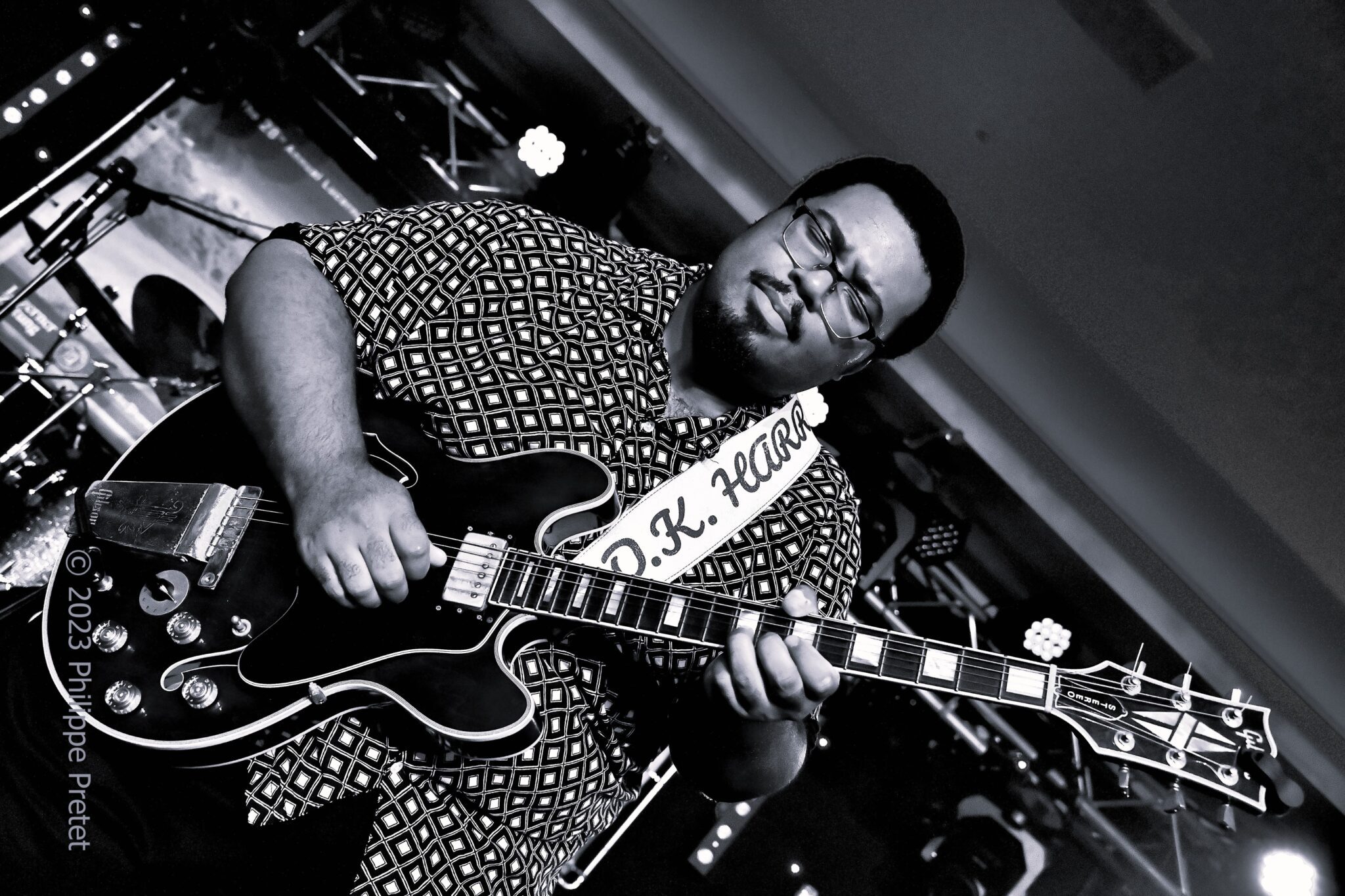
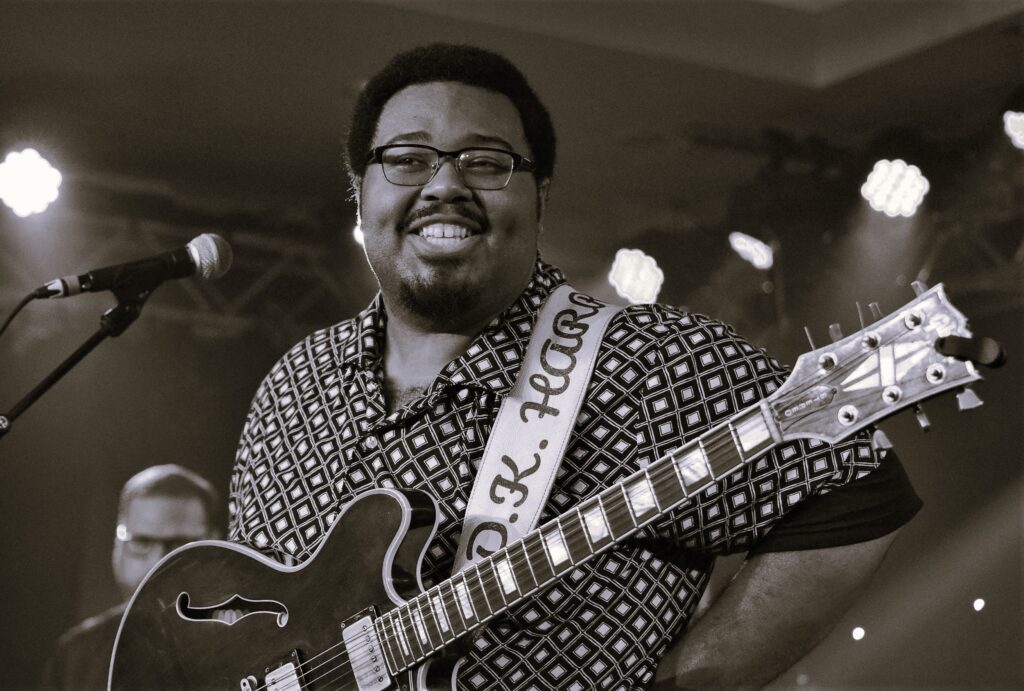
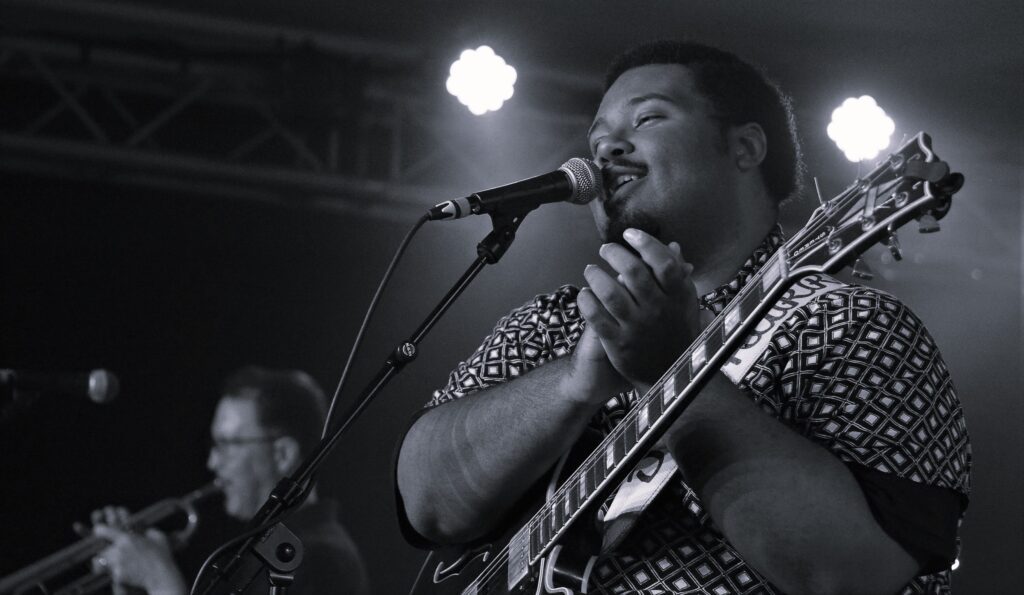
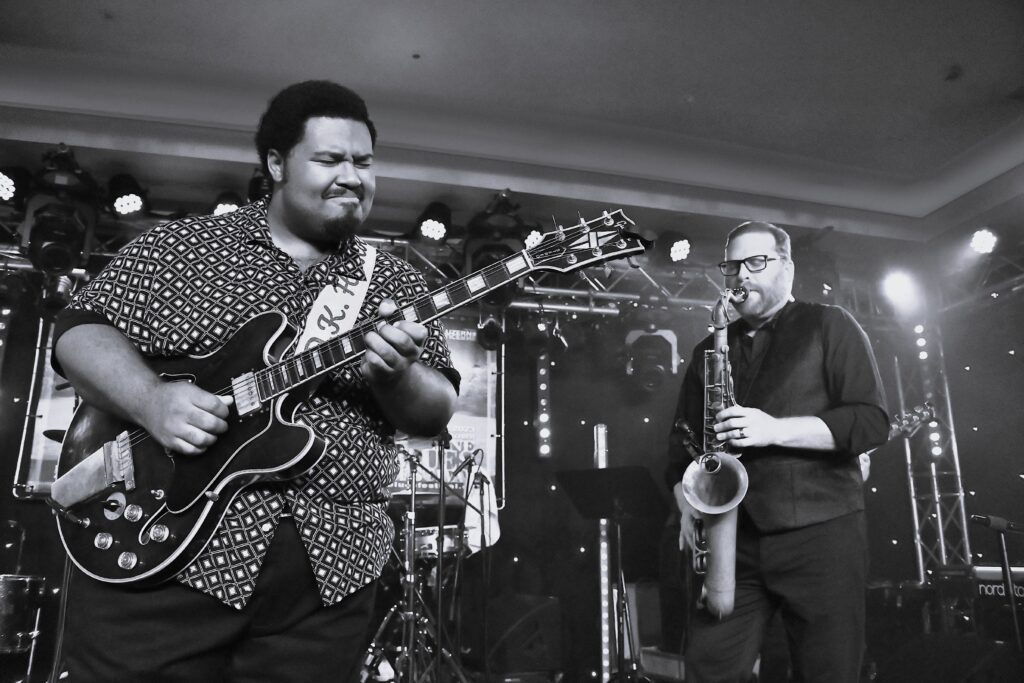
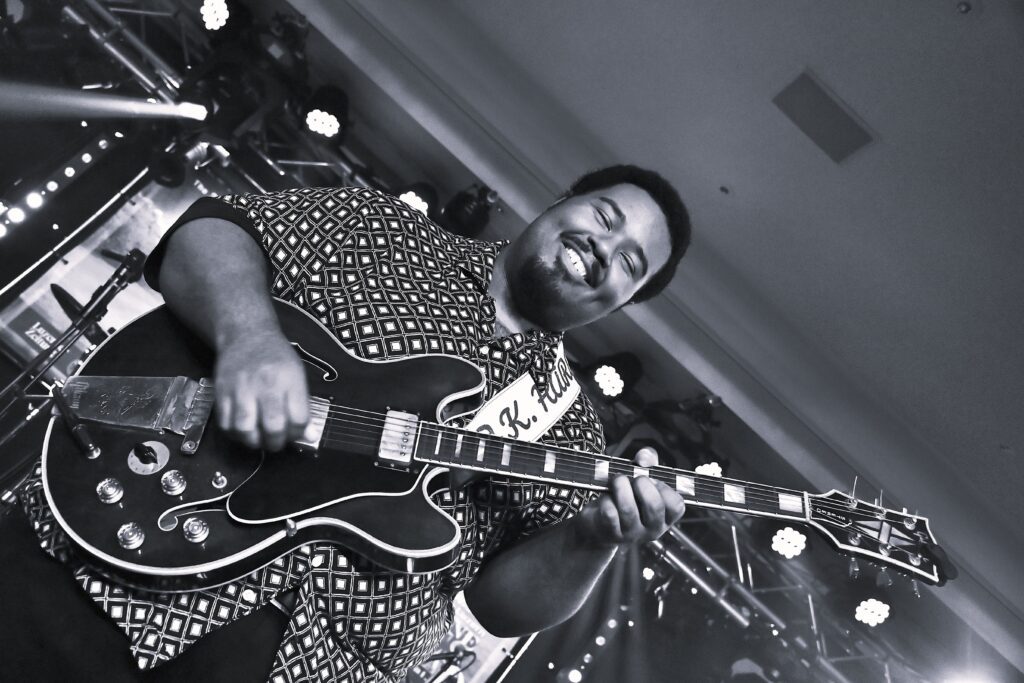






Comments are closed